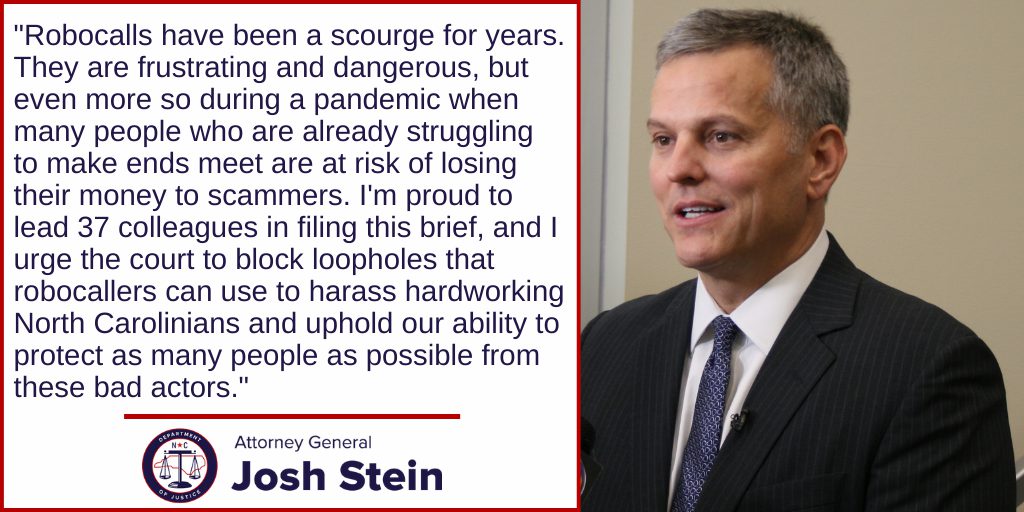
For Immediate Release:
Friday, October 23, 2020
Contact:
Laura Brewer (919) 716-6484
(RALEIGH) Attorney General Josh Stein and Indiana Attorney General Curtis Hill today co-authored and filed an amicus brief in Facebook v. Noah Duguid, a U.S. Supreme Court case that will determine the scope of the protections of the federal Telephone Consumer Protection Act (TCPA). This case is key to states’ ability to protect residents from scammers who use abusive robocall tactics to threaten and scam people out of their money. This is the second U.S. Supreme Court case this year where Attorneys General Stein and Hill have teamed up to protect people from telephone fraud and abuse.
“Robocalls have been a scourge for years,” said Attorney General Josh Stein. “They are frustrating and dangerous, but even more so during a pandemic when many people who are already struggling to make ends meet are at risk of losing their money to scammers. I’m proud to lead 37 colleagues in filing this brief, and I urge the court to block loopholes that robocallers can use to harass hardworking North Carolinians and uphold our ability to protect as many people as possible from these bad actors.”
The TCPA, enacted in 1991, generally prohibits the use of an autodialer or an artificial or pre-recorded voice to make a call to cell phone users. At issue in the case is whether autodialers include any device that can store and dial numbers automatically, or whether autodialers are limited to devices that use a random number generator. In their brief, the attorneys general side with the plaintiff, Noah Duguid, and argue that the TCPA applies to all kinds of devices that store and dial numbers automatically.
To narrow the definition of autodialers, as Facebook argues, would leave consumers unprotected under the TCPA. Narrowing the definition would also harm states’ ability to protect consumers under the TCPA and would limit collaboration among states and the federal government to take action against abusive robocallers.
Attorney General Stein has been leading national efforts to stop illegal robocallers from bothering and harming North Carolinians. In 2019, he led 51 attorneys general and 12 phone companies to launch the Anti-Robocall Principles, a series of principles the companies agreed to adopt to combat robocalls. In February, he launched the Robocall Report Task Force to encourage North Carolinians to report robocalls online (www.ncdoj.gov/norobo) and through a dedicated robo-report hotline (1-844-8-NO-ROBO). Since the launch of the Robocall Report Task Force, more than 6,000 robocall complaints have been filed with our office.
Attorneys General Stein and Hill are joined in filing today’s brief by the Attorneys General of Alaska, Arizona, Arkansas, California, Colorado, Connecticut, Delaware, Hawaii, Idaho, Illinois, Iowa, Kansas, Kentucky, Louisiana, Maine, Maryland, Massachusetts, Michigan, Minnesota, Mississippi, Nevada, New Hampshire, New Jersey, New York, North Dakota, Ohio, Oklahoma, Oregon, Pennsylvania, Rhode Island, Tennessee, Vermont, Virginia, Washington, Wisconsin, and the District of Columbia.
A copy of the brief is available here.
More on Attorney General Stein’s work to confront robocalls:
- Attorney General Josh Stein Leads States’ Efforts to Expose Illegal Robocallers
- Attorney General Josh Stein Takes Texas Robocallers to Court
- Attorney General Josh Stein Leads Bipartisan Coalition to Urge U.S. Supreme Court to Protect Ban on Robocalls
- Consumer Alert: Hang up on Robocall Coronavirus Scams
- Attorney General Josh Stein Launches Operation Silver Shield with Anti-Robocall Initiative
###
